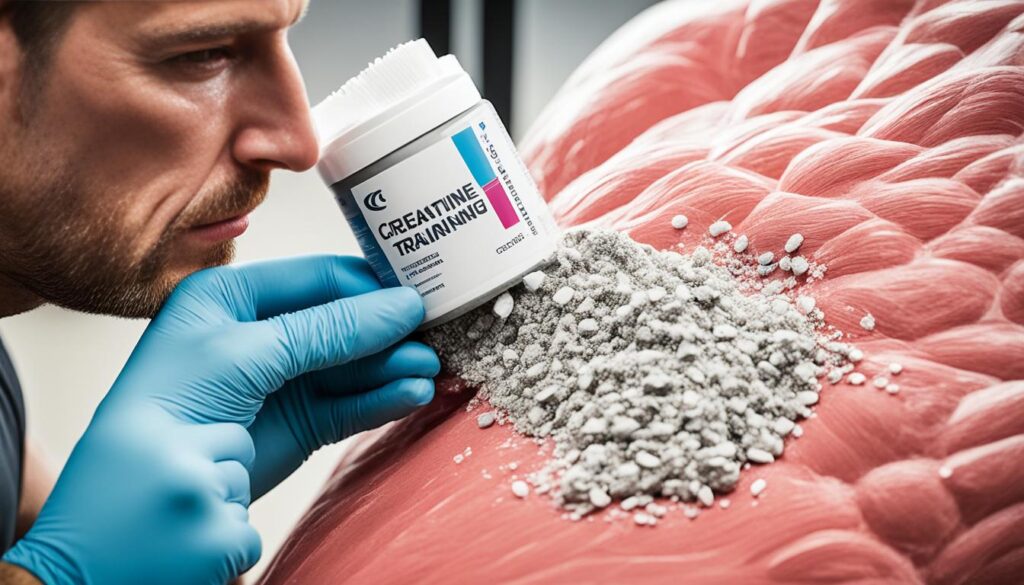Thought creatine was exclusive domain of the sprinters and powerlifters? Think again. Recent studies are painting an intriguing picture for endurance enthusiasts. As a seasoned endurance athlete myself, I’ve unearthed a fascinating intersection where creatine supplementation and endurance performance converge. While we often associate creatine with muscle mass and quick bursts of strength, its fundamental role in ATP production cannot be overlooked. ATP, or adenosine triphosphate, is the powerhouse fuel for our muscle contractions during those prolonged cycling, running, or swimming sessions that endurance athletes thrive on.
My investigative journey intends to dispel the myths surrounding creatine for endurance exercise and to bring to light the potential cognitive boosts it can provide – yes, we’re talking improved memory and concentration that can give you an edge in those endurance trials. With hydration and cramping being typical topics of concern with creatine, evidence now suggests that creatine supplementation and endurance performance might actually go hand-in-hand to reduce such risks. Though, it’s pivotal we don’t dismiss the considerations around VO2 max and the prospect of weight gain through fluid retention. Join me as we delve deep into the question: Does Creatine Enhance Endurance Training?
Key Takeaways
- Understanding creatine’s role in ATP production can offer endurance athletes an unexpected performance boost.
- Creatine is not just for strength gains; it can optimize endurance by enhancing energy availability.
- Supplementing with creatine may have cognitive benefits that are crucial during long races.
- Proper creatine use could counteract dehydration and cramping, frequently linked to endurance activities.
- The potential impact of creatine on weight gain and VO2 max must be thoughtfully considered by endurance athletes.
- Saturated creatine stores through supplementation could translate into significant endurance enhancements.
Understanding Creatine’s Role in Energy Production
As a seasoned endurance athlete, I’ve always been fascinated by how certain supplements can potentially enhance my training regimen. The benefits of creatine for endurance training have emerged as a hot topic within the athletic community, prompting a deeper look into this compound’s intricate role in energy metabolism. Below, we dissect how creatine serves as more than just a muscle builder, but as a significant influencer of sustained energy production.
The Basics of Creatine Monohydrate and ATP
Creatine monohydrate, a naturally occurring amino acid derivative found in various foods and synthesized by our body, is central to the resynthesis of adenosine triphosphate (ATP)—the energy currency of cells. During endurance activities, such as long-distance running or cycling, ATP powers muscle contractions. However, the body’s ATP stores are limited, requiring continual replenishment during extended periods of exertion. Creatine supplementation serves as a crucial element in maintaining an optimal ATP pool, thereby supporting endurance performance.
Optimizing Intramuscular Phosphocreatine Stores
To understand how does creatine improve endurance, we must first consider its impact on intramuscular phosphocreatine (PCr) stores. PCr acts as a rapidly mobilizable reserve of high-energy phosphates in skeletal muscle and plays a key role in the immediate energy system. By optimizing intramuscular phosphocreatine stores through supplementation, athletes can enhance their ability to quickly regenerate ATP during high-intensity and prolonged physical activity.
Supplementing with creatine increases free creatine and PCr concentrations in muscle tissue, facilitating faster ATP turnover and delaying muscular fatigue. This translates to prolonged high-intensity performance and improved endurance capabilities.
| Aspect of PCr | Without Creatine Supplementation | With Creatine Supplementation |
|---|---|---|
| ATP Regeneration | Slower, limits performance | Enhanced, sustains performance |
| Phosphocreatine Levels | Baseline levels, quicker depletion | Increased, prolonged availability |
| Acid Buffering | Less efficient | Improved, delays fatigue |
In summary, creatine enhances an endurance athlete’s performance not merely as a source of energy but through a systemic change in the energy production mechanisms. By fortifying the PCr stores within muscles, creatine ensures a higher and more rapid yield of ATP, which is essential during the exhaustive phases of endurance training. As I continue to integrate creatine within my training, the science makes it clear: this powerful compound is pivotal for those seeking to push the boundaries of their endurance capabilities.
Exploring the Pros and Cons of Creatine for Endurance

As I delve into the intricacies of enhancing endurance with creatine, it’s worth noting the effects of creatine on endurance athletes. Far from being a simple muscle-building supplement, creatine’s role extends into critical areas of high-intensity training and cognitive functioning, key elements for those committed to enduring sports.
Enhanced ATP Production and Exercise Performance
In evaluating the direct impact on endurance training, creatine’s enhancement of adenosine triphosphate (ATP) production is pivotal. This process is central to sustaining prolonged physical exertion, particularly in repeated high-intensity efforts. Through creatine and endurance training synergies, an athlete could potentially push the envelope, achieving greater performance thresholds.
Potential Brain Health and Cognitive Benefits
Looking beyond the physical, the cognitive benefits of creatine cannot be underestimated. Research suggests that this powerful supplement can aid in reducing mental fatigue, which translates into sharper focus and better decision-making during exhaustive sporting events, a testament to its holistic approach to athlete performance.
Addressing Creatine’s Influence on Hydration and Cramping
Moving past a common myth, clinical studies reveal a different narrative when it comes to creatine’s interaction with hydration and muscle cramping. Contrary to the concern that creatine might lead to dehydration and exacerbate cramping, data indicates it may in fact offer a protective effect, promoting better fluid balance and reducing the risk of heat-related issues.
Does Creatine Enhance Endurance Training?
As a professional copywriting journalist, I delve into the nuanced world of sports supplementation, particularly examining the query, “Does Creatine Enhance Endurance Training?” My exploration uncovers that creatine, traditionally heralded for its strength-building prowess, has untapped potential in boosting athletic stamina. This synergy between creatine and endurance training is less straightforward than its role in resistance exercises; yet, it holds a tangible impact on certain endurance facets.
To distill clarity, I focus on sports which oscillate between endurance and bursts of anaerobic effort—those are where creatine’s remarkable capabilities truly shine. The supplementation seems to enhance the time athletes can spend at peak exertion levels, thereby maximizing endurance with creatine supplementation notably in tasks that require intermittent sprints or an explosive finish, commonly referred to as ‘end-spurts.’ The most profound effects are observed within activities that test an athlete’s capability to persistently switch gears from sustainable pacing to all-out power outputs.
The selective enhancement of high-intensity, short-duration intervals within endurance sports marks creatine as a versatile supplement.
I find it necessary to present these findings in a clear and structured manner. Therefore, I’ve crafted a table that reflects the synergies between creatine and endurance training, breaking down the typical endurance sports and corresponding improvement metrics influenced by creatine:
| Endurance Sport | Impact of Creatine | Beneficial for Anaerobic Capacity |
|---|---|---|
| Long-Distance Running | Moderate – Enhanced recovery between intervals | Yes – Particularly in hill sprints |
| Swimming | Significant – Improved sprint performance in longer sets | Yes – Useful in short-distance races |
| Cycling | High – Increased power during uphill and sprint sections | Yes – Beneficial in track cycling and criteriums |
| Rowing | Considerable – Greater force generation in sprints | Yes – Supports power strokes during races |
| Cross-Country Skiing | Substantial – Enhances end-spurt capabilities | Yes – Aids in maintaining high-intensity intervals |
These findings yield a complex yet captivating narrative on maximizing endurance potential via strategic creatine supplementation. It insists on a recalibration of the commonly held perception that creatine is merely a muscle-building supplement, underlining its multidimensional role in athletic performance, particularly in endurance scenarios punctuated by high-intensity demands.
Maximizing Endurance with Creatine Supplementation Strategies

As a dedicated endurance athlete, I understand the critical role of nutrition and supplementation in achieving peak performance. Among the various supplements trending within the athletic community, creatine has gained significant prominence for its potential to enhance endurance performance. Effective creatine supplementation strategies are essential for those looking to integrate creatine into their regimen effectively.
Integrating creatine supplementation into an endurance routine requires a nuanced understanding of its impact and the best practices for consumption. I’m here to demystify the effective daily intake and discuss the cycling phases to offer clarity to fellow athletes endeavoring to improve their endurance performance using creatine.
Effective Daily Intake and the Suggested Use
The consensus on creatine for endurance exercise is to aim for a daily dosage of five grams of creatine monohydrate. This steady approach is designed to gradually saturate muscle stores without requiring loading or maintenance phases, simplifying the supplementation process. I’ve found that adding creatine to my post-workout protein shake not only streamlines my routine but ensures I’m replenishing my muscles when they’re primed to absorb nutrients.
Cycling Phases: Is it Necessary?
In my ongoing quest to bolster endurance performance, cycling phases of creatine ingestion initially seemed like a logical tactic. However, studies suggest that for endurance sports, consistent daily intake is key to maintaining muscle creatine saturation over the long term. I’ve embraced this straightforward daily supplementation strategy, reaping the benefits without complicating my schedule.
The durability of creatine’s efficacy post-supplementation is noteworthy—from my experience, retaining enhanced creatine levels for 2 to 6 weeks after ceasing daily intake helps in bridging between intensive training periods. For assurance of purity and safety, I always select creatine products from trusted brands that carry certifications like NSF Sport or Informed-Sport.
| Element | Detail |
|---|---|
| Daily Recommended Intake | 5 grams |
| Supplementation Timing | Post-workout with a protein shake |
| Minimum Duration for Saturation | At least 28 days |
| Duration of Saturation Post-Supplementation | 2 to 6 weeks |
| Certifications to Look For | NSF Sport, Informed-Sport |
My commitment to optimizing my endurance through creatine supplementation is matched only by my resolve to adhere to evidence-based practices. Sharing my experiences and strategies around creatine use in endurance disciplines, I aspire to shed light on the practical facets of supplementation that can manifest in enhanced athletic performance.
Scientific Insights on Creatine and Endurance Performance
The quest for a competitive edge has led endurance athletes to explore the effects of creatine on their regimen. Scientific studies have increasingly shone light on the benefits of creatine for endurance training, addressing crucial aspects such as muscle power, fatigue resistance, and recovery.
Improving Muscle Power and Delaying Fatigue
In the realm of endurance sports, sustaining muscle power throughout an event is fundamental. My examinations into scientific literature reveal that creatine enhances the resynthesis of ATP, the vital energy currency in our muscle cells. This ATP boost provided by creatine is not just crucial during explosive sprints but also plays a significant role in prolonging the threshold before fatigue during prolonged, strenuous endurance efforts. For endurance athletes, this translates to maintaining a higher intensity for extended periods, potentially improving overall race performance and gaining a strategic advantage during key race moments.
Recovery Advantages for Trailblazing Endurance
Another synergy between creatine and endurance training emerges in the sphere of recovery. Fast and effective recovery is imperative for back-to-back training sessions, which are common in endurance disciplines. My research showed that creatine supplementation could shorten recovery time by decreasing muscle damage and promoting muscle repair post-exercise. Such recovery advantages are pivotal for endurance athletes seeking to push boundaries while maintaining a rigorous training schedule.
| Aspect of Endurance Training | Without Creatine | With Creatine Supplementation |
|---|---|---|
| ATP Resynthesis Rate | Slower, resulting in faster onset of fatigue | Enhanced, delaying fatigue and improving performance |
| Muscle Recovery | Standard recovery time with potential muscle damage | Faster muscle repair and reduced damage, allowing more frequent intense workouts |
| Muscle Power Sustainability | Decreases as race/event progresses | Maintains higher output for longer periods |
The research I’ve covered establishes not only the evident benefits of creatine for endurance training but also showcases the broader implications for crafting synergistic supplementation strategies tailored to endurance athletes. With these scientific insights, we’re gaining a more profound understanding of how creatine could propel endurance performance to new heights.
Addressing the VO2 Max Controversy with Creatine Use

As a dedicated journalist and athletics enthusiast, I’ve scrutinized the complex relationship between creatine supplementation and VO2 max, a critical measure of aerobic capacity for endurance athletes. A contentious debate simmers among professionals regarding the impact of creatine on endurance athletes, particularly with how it influences their aerobically taxing pursuits.
Investigating the Impact on Aerobic Capacity
In my thorough examination, a trend appears where increased body mass from creatine-induced fluid retention might skew VO2 max results. This has prompted some in the endurance community to question the suitability of creatine in their training regimens. To ensure an accurate assessment, athletes must regularly monitor their aerobic capacity through precise baseline and follow-up tests whilst supplementing with creatine.
Balancing the Effects of Weight Gain on Performance
Endurance athletes typically prioritize a balance between strength and a lean physique. To address concerns about creatine’s role in balancing weight gain and endurance performance, strategies such as avoiding creatine loading phases or discontinuing its use weeks before competitions have been suggested. This simultaneous maintenance of elevated creatine stores and negation of excess fluid retention could provide a harmonious solution for endurance athletes looking to reap the benefits of creatine without compromising their VO2 max.
| Creatine Strategy | Benefits | Considerations |
|---|---|---|
| Maintaining Regular Creatine Intake | Consistent elevated creatine stores for sustained energy | Monitor weight regularly |
| Avoiding Loading Phases | Reduced risk of rapid weight gain | Potential delay in achieving creatine saturation |
| Discontinuing Before Competitions | Decreased fluid retention for optimal weight | Ensuring creatine stores remain high enough for performance |
| Baseline and Follow-up VO2 Max Tests | Understanding creatine’s real impact on aerobic capacity | Adapting creatine intake based on test results |
In summary, the potential for creatine to influence body weight—and consequently VO2 max—cannot be overlooked by the endurance community. Yet, with judicious use and proper monitoring, I believe athletes can successfully integrate creatine into their training protocols, potentially benefiting both their power output and endurance capabilities without sacrificing peak aerobic performance.
Creatine and Muscle Recovery: What Endurance Athletes Should Know

As someone who regularly engages in endurance exercises, I’ve come to understand the significant benefits of creatine for endurance exercise. It’s not just about the immediate energy boost—it’s also about how it can aid in muscle recovery with creatine. Researchers have found that creatine can play a pivotal role in minimizing exercise-induced muscle damage, an important factor for athletes looking to optimize their training outcomes.
Reducing Exercise-Induced Muscle Damage
Intense training can often lead to muscle wear-and-tear. However, incorporating creatine supplements into the recovery process can mitigate these effects. By enhancing the muscle’s resilience, creatine has been shown to decrease the likelihood of damage. Thus, athletes can endure rigorous training schedules with a reduced chance of sustaining muscle injuries.
Faster Bounce-Back from Intense Workouts
The ability to recover rapidly after a grueling workout is invaluable for athletes aiming for consistent performance. Creatine stands out for its role in accelerating muscle repair and regeneration, helping endurance athletes maintain a rigorous and continuous training regimen—a key component for success in endurance sports.
Creatine for Endurance Exercise: Gauging the True Impact

As I delve into the synergy between creatine and endurance training, it’s intriguing to piece together how these two may benefit one another. While creatine’s fame largely hinges on strength and power sports, the quest to unlock its potential in maximizing endurance with creatine supplementation has garnered particular interest within the athletic community. My exploration here seeks to determine just how impactful creatine can be when working in concert with systematic endurance regimens.
Tracking Endurance Adaptations and Performance Gains
In assessing the enhancements in endurance with creatine, we must consider the physiological changes that unfold over a span of training adaptations. Key indicators like improved time to exhaustion and even subtle increases in exercise intensity are tangible signs that something’s working. The exciting part is that these gains are not merely anecdotal; they’re grounded in scientific evidence and bolstered by countless hours athletes spend fine-tuning their bodies. Let’s examine the real-world implications of this by dissecting data that reflects the synergy between creatine and the evolutionary pace of endurance training.
Sifting Through the Evidence: Endurance Spurts and Critical Power
When it comes to sports that hinge on the razor’s edge of competitive intensity, the question that surfaces is how creatine supplementation might influence those crucial shreds of seconds that separate victory from defeat. Research increasingly points toward creatine’s role in boosting anaerobic work capacity—particularly beneficial in events punctuated by intermittent surges, such as the spirited climbs in mountain biking or the final sprint in a long-distance ski race. But don’t just take my word for it; the numbers speak volumes.
| Endurance Activity | Without Creatine Supplementation | With Creatine Supplementation |
|---|---|---|
| 400-meter Sprint | Baseline performance | Performance improvement |
| Cross-Country Skiing (Sprint) | Baseline endurance | Enhanced final spurt capability |
| Mountain Bike Climb | Baseline anaerobic power | Increased critical power output |
| Track Cycling (Keirin) | Baseline acceleration | Increased power during final lap |
The data above underscores a trend that I’ve witnessed time and again: creatine has a pronounced effect on activities demanding sudden, high-intensity bouts. By closing the gap between one’s current limitations and their peak performance potential, creatine not only complements an athlete’s exhaustive training but it could also be the linchpin in their quest to surpass personal records and edge out the competition when it counts the most.

As we delve into the realm of creatine supplementation side effects, it’s imperative for athletes to be cognizant of the various challenges that might arise. Understanding and managing creatine-induced fluid retention is one such hurdle. Fluid retention is commonly perceived as weight gain, a side effect linked to the increased intracellular water within muscle cells. Effective strategies for managing this side effect include maintaining adequate hydration and possibly adjusting the creatine dosage to align with individual tolerance levels.
Understanding and Managing Fluid Retention
The issue of fluid retention can be nuanced, as it often reflects increased muscle mass rather than fat. To mitigate concerns about creatine and kidney health, it is vital to approach creatine supplementation with prudence, especially in relation to hydration and consumption parameters.
Addressing Gastrointestinal Discomfort with Creatine
Creatine supplementation can occasionally cause gastrointestinal discomfort when consumed in large amounts or without sufficient water. Bloating, cramping, and other digestive issues are reported, yet they can often be resolved by simply spreading the dosage throughout the day or taking it with meals.
Long-Term Safety: Debunking the Kidney Function Myth
Recent evidence has effectively debunked the myth regarding the adverse effects of creatine on kidney health, particularly in healthy individuals adhering to recommended doses. It is, however, always advised to consult a healthcare professional before initiating any supplementation, especially for individuals with pre-existing kidney conditions.
| Side Effect | Strategies for Management |
|---|---|
| Creatine-induced fluid retention | Monitor hydration status, adjust dosage as needed |
| Gastrointestinal discomfort | Take with meals, spread dosage, ensure proper solubility |
| Concerns about kidney health | Maintain recommended dosage, consult a healthcare professional |
Ultimately, balancing these factors involves a well-informed approach to supplementing with creatine. Athletes should always consider their personal response to creatine and remain aware of potential needs for adjustments to their supplementation plans. Leveraging creatine’s performance benefits while conscientiously managing side effects is imperative for optimizing both health and athletic performance.
Conclusion
In my thorough analysis of creatine’s role in enhancing endurance training, it has become evident that individualization is key when considering supplementation regimens. The divergent responses among athletes to creatine supplementation underscores that there is no one-size-fits-all approach. Genetic makeup, diet, baseline creatine levels, and athletic training all play significant roles in how one might benefit from additional creatine.
Personalizing Creatine Intake: A Case-by-Case Approach
Personalizing creatine intake for endurance athletes is not only sensible but essential. Careful attention to one’s unique physiological reactions, training demands, and competitive goals can help determine the exact supplementation strategy that could lead to performance enhancement. This meticulous process involves routine evaluation and tweaking of creatine dosages, always aiming to maximize endurance with creatine supplementation.
The Verdict on Enhancing Endurance Training with Creatine
After extensive research and consideration, the verdict on creatine for endurance training is not without its complexity. While creatine has proven effective in certain scenarios, notably where explosive power and rapid recovery are beneficial, it may not consistently boost long-duration, steady-state endurance performance across all athletic disciplines. As with any supplement, monitoring and adjusting intake based on individual performance metrics is necessary to fully harness creatine’s potential to support one’s endurance endeavors.
FAQ
Does Creatine Enhance Endurance Training?
Creatine can enhance certain aspects of endurance training, particularly in events that require short, high-intensity bursts and stamina in anaerobic conditions. While the effects on traditional, steady-state endurance activities are less pronounced, it is beneficial for intermittent high-intensity endurance efforts.
What is Creatine Monohydrate?
Creatine monohydrate is a dietary supplement that increases intramuscular stores of phosphocreatine, which serves as a pivotal source of adenosine triphosphate (ATP), the primary energy molecule for muscle contractions during high-intensity exercise.
How Does Creatine Improve Endurance?
Creatine improves endurance by optimizing intramuscular phosphocreatine stores, thereby helping to maintain ATP levels during exercise, decreasing muscle acid buildup, and possibly enhancing the body’s ability to perform repeated high-intensity efforts with improved recovery.
Can Creatine Cause Dehydration or Muscle Cramping?
Although initially believed to be a concern, clinical research indicates that creatine does not exacerbate the risk of dehydration or muscle cramping. In some cases, it may actually help maintain better hydration and reduce the risk of heat-related issues.
What Are the Recommended Creatine Supplementation Strategies for Endurance Athletes?
It is recommended that endurance athletes take 5 grams of creatine monohydrate daily to achieve saturation of creatine stores, and this does not need to be cycled. Consistency is key, and the supplement should be taken for at least 28 days to realize full benefits.
How Does Creatine Affect Muscle Power and Recovery?
Creatine supplementation has been shown to improve muscle power and assist in faster recovery post-exercise by reducing exercise-induced muscle damage and facilitating muscle repair, which may translate to improved endurance performance.
Is There a Link Between Creatine Use and VO2 Max?
Some studies indicate a potential negative impact on VO2 max due to creatine-induced weight gain from fluid retention; however, this is not a direct effect on cardiovascular function. Athletes concerned about this can monitor and manage their weight while supplementing with creatine.
How Does Creatine Aid in Muscle Recovery for Endurance Athletes?
Creatine aids muscle recovery by reducing exercise-induced muscle damage and accelerating repair processes. This helps endurance athletes manage training loads more effectively and decreases recovery times between intense training sessions.
Are There Any Known Side Effects of Creatine Supplementation?
Potential side effects of creatine supplementation include temporary weight gain through fluid retention and gastrointestinal discomfort at high doses or if not dissolved properly. However, these can be managed by adjusting the dosage or timing of intake.
Should Endurance Athletes Personalize Their Creatine Intake?
Yes. Personalizing creatine intake is essential since individual responses to supplementation vary due to genetics, pre-existing creatine levels, diet, and training status. Careful monitoring of performance indicators is necessary to maximize its ergogenic potential.




